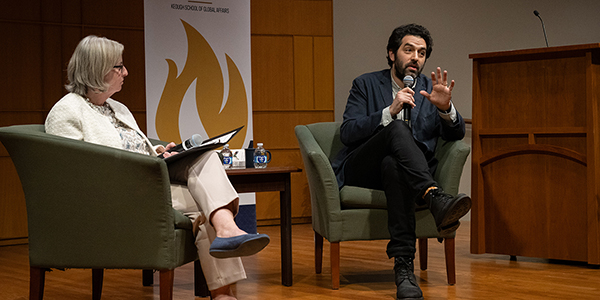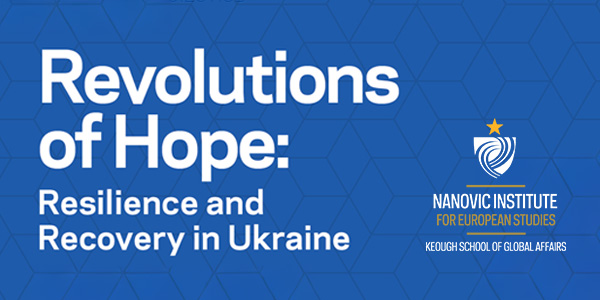The third virtual event of Global Dialogues: The Worsening Water Crisis was moderated by Dhiraj Mehra, Academic Director for Initiatives at Notre Dame International (NDI) Mumbai, India and featured special guest Krupali Uplekar Krusche, Associate Dean at the School of Architecture and Director of DHARMA. The goal of this session was to expand on these professors’ current research and its three main domains: 1) the effect of sea level rise on human activity in Mumbai, 2) the mitigation or “reversal” of sea level rise and how it can be realistically countered, and 3) the future of engineering solutions in preventative measures.
The event consisted of a free-flowing discussion and Q+A session with Director Mehra and Professor Krusche. He began by laying out the dire struggles faced by citizens in Mumbai due to sea level rise and global warming, issues that are quite interconnected at the heart of the matter. Director Mehra opened the floor to Professor Krusche by asking her to describe sea level rise and how it is affecting citizens in Mumbai. Krusche explained that sea level rise comes as a result of glacial melts and temperatures rising, which specifically threatens low-lying cities. Professor Krusche works in digital documentation of cities, and she was able to use her skills to help figure out what would be the most beneficial way for cities to develop in the future when they are confronted by these types of issues. With specific vulnerabilities affecting the daily lives of citizens, this put Mumbai at the forefront for sea level rise research. Director Mehra further asked Professor Krusche to elaborate on what made Mumbai so distinct in terms of sea level rise. Krusche stated that the combined impact of monsoons and sea level rise is creating increased havoc on the infrastructure of the city. Even though this is a disastrous combination, there was little research previously being conducted in this area.
Professor Krushe goes on to discuss how the levels of greenhouse gasses and CO2 emissions will impact how long it will take for sea level rise to seriously impact Mumbai. She discusses the difficulties in data collection for regions using aerial methods, due to foliage and other factors that impact the collection and may cause inaccurate data sets. Director Mehra directed Professor Krusche to talk more about how human activity will be complicated by sea level rise. Krusche discusses how lots of Mumbai is built on top of historic landfills, which therefore causes issues during sea level rises. In addition, fishermen live on the coast and have their livelihoods closely connected to the ocean and its health. It is impossible for these individuals to retreat away from the coast because population density throughout the city is quite high everywhere already.
Director Mehra adds that a lot of the responses to sea level rise are known as climate change mitigation and asks Professor Krusche to speak on this topic with relation to her own work. Mitigation would be finding ways to make sure sea level does not reach certain heights. If the water does reach to those levels then there needs to be certain efforts already in place in those areas to offset the effects of the sea level rise. Adaptation would require individuals to leave the areas that are affected by sea level rise and find new and more development-available areas.
Looking to a larger scale, Director Mehra poses the thought of whether climate change, with respect to sea level rise, can truly be reversed. Professor Krusche states that reversal is an extreme stance at this point in time, but that individuals can work to find sustainable solutions. There needs to be a balance between the built environment and the natural environment. This requires that cities be designed in a way that allows collaboration between infrastructure and nature. Her final thoughts are that humanity needs to first stop the effects of climate change and then move on to finding avenues to reverse climate change.
The discussion moved on to how interdisciplinary research projects and symposiums affect the knowledge on climate change. Professor Krusche hopes that these projections will reach average citizens to inform them on how dire these effects will be on their lives. Some cities have implemented active plans based on these projects to develop cities in a way that mitigates their risks associated with sea level rise. Moving on, Director Mehra asked Professor Krusche how policies need to be changed to respond to climate change. She proposes integrated planning as a way to take research and implement their work into solution-based policies. Furthermore, Professor Krusche explains how her work has developed over time and with what supports it has flourished. Finally, Director Mehra asks how individuals can have a role in stopping climate change. Professor Krusche responds that community members need to strive to reduce the green footprint of the cities and reduce non-recyclable production.
Director Mehra and the panel of Professor Krusche finished the event with questions from the audience, including questions surrounding sea level rise and availability of water supply, how migration fits into the mitigation and adaptation responses, and city design structures and how people naturally tend to situate themselves within cities.
Visit the event page for more.





